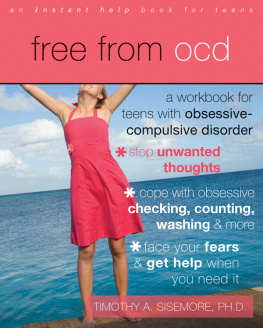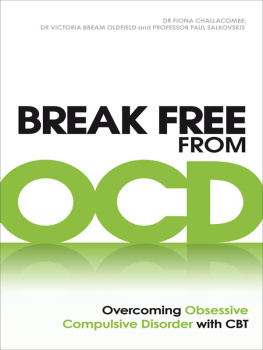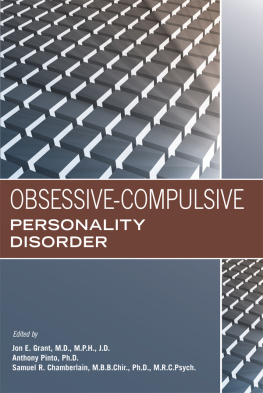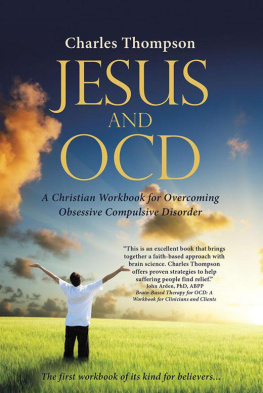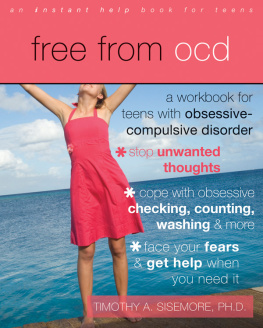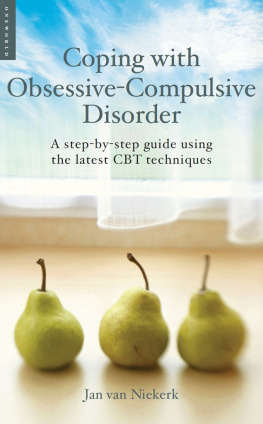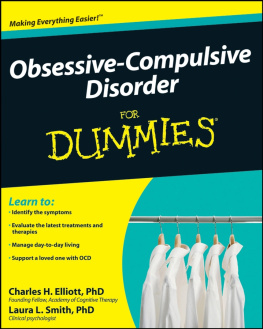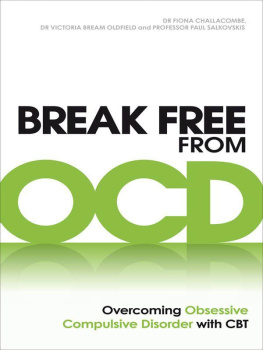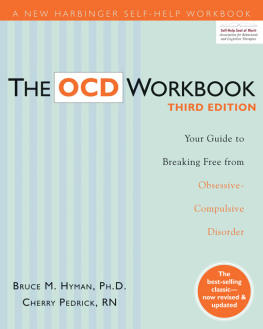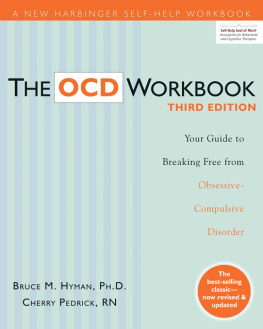Timothy A. Sisemore, Ph.D., is professor of counseling and psychology at Richmont Graduate University in Chattanooga, TN, and maintains a private practice in clinical psychology. He specializes in treating anxiety disorders in children and adolescents. Sisemore is author of several books, including I Bet I Wont Fret.

Publishers Note
This publication is designed to provide accurate and authoritative information in regard to the subject matter covered. It is sold with the understanding that the publisher is not engaged in rendering psychological, financial, legal, or other professional services. If expert assistance or counseling is needed, the services of a competent professional should be sought.
Distributed in Canada by Raincoast Books
Copyright 2010 by Timothy A. Sisemore
Instant Help Books
A Division of
New Harbinger Publications, Inc.
5674 Shattuck Avenue
Oakland, CA 94609
www.newharbinger.com
Cover design by Amy Shoup
All Rights Reserved
Epub ISBN: 9781608820979
The Library of Congress has Cataloged the Print Edtion as:
Sisemore, Timothy A.
Free from OCD : a workbook for teens with obsessive-compulsive disorder / Timothy A. Sisemore.
p. cm.
ISBN 978-1-57224-848-9
1. Obsessive-compulsive disorder in adolescence--Treatment. 2.
Obsessive-compulsive disorder in adolescence--Popular works. I. Title.
RJ506.O25S57 2010
618.92'85227--dc22
2010019138
contents
A Letter to Teens
Dear Friend,
From the fact that you picked up this workbook, Id guess that you have faced some stubborn, troubling thoughts or some irritating, strong urges to repeat certain behaviors. Youre certainly not alone. Many young people wrestle with similar problems, varying from some that are pretty mild to those that are so severe that they change almost every aspect of life. Most teenagers who have obsessions and compulsions keep them to themselves as best they can. They might confide in a parent, friend, or teacher, but for the most part they find the symptoms either embarrassing or fear getting teased about them. Thats understandablebeing young is hard enough without having to deal with obsessions and compulsions.
I believe that you can beat these problems, or at least make them a lot easier to deal with, if you faithfully work through this book. I know that the idea of a workbook may put you off, but its the work that will make you betternot just reading. In fact, I think that the time you spend doing these activities will easily be made up by your spending less time dealing with stubborn thoughts and rituals.
These thoughts and rituals are part of a full-blown problem called obsessive-compulsive disorder (OCD). The primary symptoms are obsessions, or thoughts that occur over and over, which are usually worries about something bad happening. Well be calling them stuck thoughts to stress that they dont have to be symptoms, just irritating problems. Compulsions are the almost irresistible impulses to do certain things over and over. They are often used to ease obsessions. Well be calling these rituals in the pages ahead. But I dont want you to focus on whether or not you officially have OCD. Rather, if you have stuck thoughts and/or rituals, these activities should help. You may do them completely on your own or have a parent or friend help keep you going when the activities challenge you a bit. Either way, your efforts will help you regain control of your life, for stuck thoughts and rituals want control of your life, and they shouldnt have it.
So congratulations on taking the first step to beating these thoughts and ritualsadmitting that these things are bothering youand on picking up a book to help you do something about it.
I wish you the best as you break free from OCD.
Tim Sisemore
A Letter to Parents or Caregivers
Dear Caring Adult,
Teens with obsessions and compulsions are usually not bad kids and so their anxiety and frustration are often overlooked. By being concerned enough about a teen in your life to look into this workbook, youve taken a step to help the young person you care about.
Teens vary in how open they are about obsessive-compulsive disorder (OCD), for its a pain to feel controlled by these symptoms at a time of life when teens are trying to develop more freedom. But beating the symptoms of OCD can be very freeing (thus the title of the book) and can help teens move on into adulthood. Moreover, beating something as challenging as obsessions and compulsions can boost teens' self-confidence as they face challenges in the future.
Teens also vary in how much theyll want adults to be involved in their completion of this workbook. I suggest giving your teen that choice. You can serve as encourager and accountability partner, but only if the teen is receptive to that. You also can help if your teen gets stuck in obsessions or compulsions without being aware of itagain, only if he or she is open to that. If not, you may be seen as nagging or interfering. The bulk of the work in beating these symptoms is for your teen, not you. You might just ask what role your young person wants you to take, and stick to it.
The techniques in the book are built on scientifically supported strategies for counseling. Ive turned them into activities so that many teens will be able to make progress without counseling. However, OCD can be stubborn and counseling often is necessary. These activities can also be part of such counseling. While medication can be helpful as well, I suggest at least giving the workbook and counseling chances first unless your teen is suffering so much that it is compromising a normal life.
I know your teen will appreciate your support, your respect, and your patience as he or she moves toward victory over obsessions and compulsions, and I wish you both success. Thank you for caring.
Tim Sisemore
1 recognizing your stuck thoughts and rituals
for you to know
There are many kinds of obsessions (stuck thoughts) and compulsions (rituals) that can trouble you, and they may change over time. Learning to recognize them can help you overcome them.
In the classroom, Marci seemed to act like everyone else. But in private, she really struggled. Her mind was almost always on trying not to get sick. She worried about being around anyone who had the slightest sniffle, and she waited till she got home to go to the bathroom so she didnt have to use a public oneand so others wouldnt see how long she spent washing her hands after she went. She also feared that something bad might happen to her mom if she didnt tap her foot ten times every time this worry crossed her mind, which was often. Marci held it together fairly well around her friends, but these stuck thoughts and rituals broke loose when she got home.
Marci had only a couple of the common problems that make up obsessive-compulsive disorder. Well call obsessions stuck thoughts as they are worries that are hard to shake (like Marcis worries about getting sick or something happening to her mom). Well call compulsions rituals as they are things you do over and over (like Marcis washing her hands and tapping her foot), usually to try to control stuck thoughts.
Since youre reading this, its likely youve had some stuck thoughts or rituals. The first step to beating them is to recognize them.
for you to do
Think through the past couple of days. How many of these stuck thoughts have you had? Using your journal, list the thoughts you come up with.

